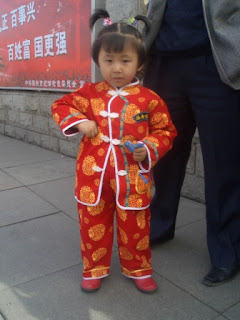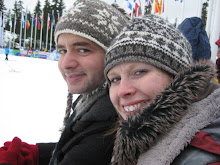
My first weeks back in Zhangye have been pretty relaxing, as my students have had their assigned cleaning duty, when they clean the campus for a week instead of going to class. I passed two of my students wearing red arm bands, who instead of cleaning had volunteered for the job of patrolling campus with clipboards in search of students playing hooky. A couple of weekends ago, me and Andrew had a visit from a friend named Daisy, who was an English student last year and now works as a teacher outside of Lanzhou. We shared a Big Plate of Chicken and "played" together along with her friend Rose. There are many awkward English phrases common here that come from translating too literally from Chinese.
While I was with them, Daisy and Rose made plans to make dumplings with Yang Lili, a teacher in the English department also known as Isabella. Daisy assured me I was also welcome, but my arrival at Isabella's apartment made her incredibly nervous and self-conscious. She said she had never invited a foreigner to her home before, even her co-teacher, because her cooking wasn't good enough. She also said she was embarrassed because the food wasn't ready, and when she has guests she only allows them to come when the food is finished. She was hardly able to talk about anything besides my being there, even joking several times she should break off her friendship with Daisy. When the first round of dumplings was finished, she insisted me and her husband should start first, but her husband immediately got up to take care of some office business without taking a bite. Despite her constant self-deprecation the food was, as with every single time a Chinese person has cooked for me, delicious. The focus on your foreignness is one of the frustrations of living in China, especially coming from a diverse country like America. It's refreshing when I do meet people who interact with me as if I were just another of their friends, Daisy being an example.
For instance, my friend Little Ma opened a new guitar shop in front of the school yesterday, and invited me to come at 10 a.m. for the grand opening. As expected, he wasn't there, and one of his friends said in very loud, slow Chinese "go have a seat inside". I spent a pointless hour sending text messages on my phone, during which time Little Ma never showed and none of them said a word to me, despite knowing me for most of a year. Little Ma is also fond of calling me "the foreigner" when talking about me with other people.
Plenty of people want to make friends with us, but far fewer are interested in forming any kind of substantial friendship and really getting to know us. We also get random invitations from strangers. For instance, the other day Miss Mao arranged a mysterious lunch with a friend who wanted to meet the foreign teachers at Hexi. We were sure we were going to be talked into something, perhaps English lessons for a middle school son or daughter. The lunch was extravagant, round-table style with a rotating middle for the dishes, and the men were all wearing suits, but it turned out they just wanted to have lunch, play drinking games with us and take some pictures. Which was fine, but it struck me how little interest they had in actually talking to us, since we all spoke some level of Chinese. The meal ended with a kind of Chinese (or likely Mongolian) game where a girl in a colorful minority outfit presents you with a scarf and sings, insisting you drink until she stops.

Though I unfortunately missed the Chinese New Year, which apparently is a fun time to be around Chinese people, the Spring Festival holiday associated with it lasts two weeks, and I caught the last few days in Zhangye. The last day is known as the Lantern Festival in English, and big portions of the city were decked out with dozens upon dozens of red lanterns and decorations. The square was Ground Zero, and had become something out of a Dr. Seuss illustration. Zhangye swelled with people, many coming in from the surrounding countryside to see the lanterns. For a day Zhangye was the nightmare I feared China could be like, with so many people it was a struggle just to get around. Chinese people love firecrackers, and all evening we were surrounded by a cacophony of noise. It sounded like a war zone, and with so many children setting off fireworks, I was sure somebody was going to lose an eye. The restaurants were so busy that when we sat down for dinner late in the evening, they had run out of water (which must be boiled). When Daisy went back to Lanzhou the next night, there were so many people at the station they wouldn't let non-ticket holders in to see off their friends (though me and Andrew, playing the ignorant foreigners, got in). Daisy presumably had to find a place to stand for the 8 hour overnight trip, and I heard of another girl who didn't use the bathroom on a long-distance train ride because there were too many people. According to the interesting
Chinese Lessons, China is the only country in the world to recognize to effects of traveling in overcrowded trains as a psychiatric condition, and those who commit crimes while suffering from "travel psychosis" are spared the death penalty. So the Lantern Festival was exciting, but also an assault on the senses. Actually, I guess you could say that about China as a whole.



 I broke my bed today. Not for any exciting reason - I moved from a lying to a sitting position too aggressively, and heard a loud crack beneath me. You see, I don't sleep on a mattress, but rather a series of inexpensive wood planks with a bit of padding over the top. It leaves something to be desired in comparison to the typical American bed, but I've really never been bothered by it. I do have an entire spare bedroom with a bed that is not only larger but has a thick (yet surprisingly unyielding) mattress, but I've become somehow fond of the "plank bed." Whatever the reason, I find amusement in these small inconveniences of living here, and I can't say I was too bothered about it.
I broke my bed today. Not for any exciting reason - I moved from a lying to a sitting position too aggressively, and heard a loud crack beneath me. You see, I don't sleep on a mattress, but rather a series of inexpensive wood planks with a bit of padding over the top. It leaves something to be desired in comparison to the typical American bed, but I've really never been bothered by it. I do have an entire spare bedroom with a bed that is not only larger but has a thick (yet surprisingly unyielding) mattress, but I've become somehow fond of the "plank bed." Whatever the reason, I find amusement in these small inconveniences of living here, and I can't say I was too bothered about it.














